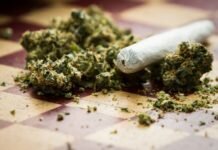
CBD is everywhere. But is it a scam?
The coffee shop in my Brooklyn neighborhood has a chalkboard outside. It usually reads something like, “Our soup of the day is coffee.” Recently, though, it’s had a marijuana leaf on it, drawn in green chalk.
Recreational marijuana is not legal in New York state. What the coffee shop is selling is CBD-infused lattes; CBD, which stands for cannabidiol, is a non-psychoactive compound found in the cannabis plant. Out of curiosity, I bought one. It cost $9 and tasted like a latte with that hint of marijuana herbiness you get from a weed cookie. Google research informed me I would not get high but would be calmer, less anxious, maybe a little sleepy. I have no idea if I felt anything at all. Mostly, I felt like I just spent $9 on coffee.
My coffee shop is not unusual in selling CBD products. In New York, and all over the country, you can find CBD oil in convenience stores, CBD vapes in smoke shops, and CBD tinctures and topical creams in beauty stores. You can buy CBD dog treats in Chicago, a $700 CBD couples massage in Philadelphia, and CBD chocolate chip cookies in Miami. CBD is also being combined with ice cream, savory snacks, and cocktails. Even Coca-Cola is reportedly working on a CBD-infused beverage.
CBD exists at the confluence of three huge consumer trends. The first is the herbal supplement boom, a $49 billion-a-year industry that has seen rapid expansion since about 2010. The second is the rise of the anxiety economy, in which all sorts of products, from fidget spinners to weighted blankets, are pitched as reducers of the mild panic of everyday life. And the third is the near-overnight creation of a legitimate cannabis industry, thanks to the spread of marijuana legalization.
The exact legality of CBD is tricky. The Drug Enforcement Administration maintains that CBD is federally illegal but will not bother going after anyone for possessing or using it. Many argue that a provision in the 2014 farm bill allowing industrial hemp pilot programs, mostly aimed at the textile industry, actually makes non-THC use of cannabis legal; the much-delayed 2018 farm bill would make CBD and industrial hemp legal nationwide if passed as it stands.
It doesn’t really matter: The result is that anybody, in any state, can seemingly buy CBD online or in a local brick-and-mortar shop without fear of arrest. That availability made CBD at least a $350 million industry last year; some estimates suggest that by 2020, annual sales of CBD products could top $1 billion — and some say it already has.



